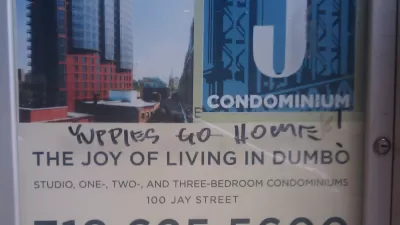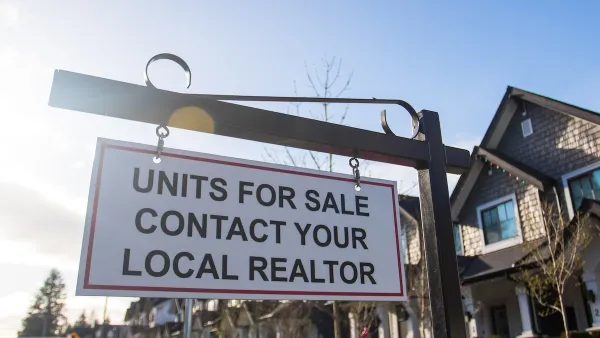The prevailing wisdom is that as a neighborhood gentrifies, long-time, low income residents are forced to move out because of rising rents, i.e. displacement. Two studies from Columbia University and the Federal Reserve draw different conclusions.

NPR News investigative correspondent Laura Sullivan "has cast a light on some of the country's most disadvantaged people." In this piece, which you can listen to as well as read, she reports from a changing, "gentrifying" if you will, neighborhood in the District of Columbia. And that means poor people are being forced out, right?
Lance Freeman, the director of the Urban Planning program at Columbia University [and Planetizen blogger], says that's what he believed was happening, too. He launched a study, first in Harlem and then nationally, calculating how many people were pushed out of their homes when wealthy people moved in.
His findings surprised even him. "(P)eople in neighborhoods classified as gentrifying were moving less frequently", he states. "Freeman's work found that low-income residents were no more likely to move out of their homes when a neighborhood gentrifies than when it doesn't," Sullivan writes.
"That squares with a recent study by the Federal Reserve Bank of Cleveland," writes Sullivan.
"We're finding that the financial health of original residents in gentrifying neighborhoods seems to be increasing, as compared to original residents in nongentrifying, low-priced neighborhoods," says Daniel Hartley, a research economist with the bank.
"He says higher costs can push out renters, especially those who are elderly, disabled or without rent-stabilized apartments. But he also found that a lot of renters actually stay — especially if new parks, safer streets and better schools are paired with a job opportunity right down the block," writes Sullivan.
Read here the results of a recent survey about who benefits from redevelopment in neighborhoods in the District. More findings from the Federal Reserve study can be found here.
FULL STORY: Gentrification May Actually Be Boon To Longtime Residents

Maui's Vacation Rental Debate Turns Ugly
Verbal attacks, misinformation campaigns and fistfights plague a high-stakes debate to convert thousands of vacation rentals into long-term housing.

Planetizen Federal Action Tracker
A weekly monitor of how Trump’s orders and actions are impacting planners and planning in America.

In Urban Planning, AI Prompting Could be the New Design Thinking
Creativity has long been key to great urban design. What if we see AI as our new creative partner?

King County Supportive Housing Program Offers Hope for Unhoused Residents
The county is taking a ‘Housing First’ approach that prioritizes getting people into housing, then offering wraparound supportive services.

Researchers Use AI to Get Clearer Picture of US Housing
Analysts are using artificial intelligence to supercharge their research by allowing them to comb through data faster. Though these AI tools can be error prone, they save time and housing researchers are optimistic about the future.

Making Shared Micromobility More Inclusive
Cities and shared mobility system operators can do more to include people with disabilities in planning and operations, per a new report.
Urban Design for Planners 1: Software Tools
This six-course series explores essential urban design concepts using open source software and equips planners with the tools they need to participate fully in the urban design process.
Planning for Universal Design
Learn the tools for implementing Universal Design in planning regulations.
planning NEXT
Appalachian Highlands Housing Partners
Mpact (founded as Rail~Volution)
City of Camden Redevelopment Agency
City of Astoria
City of Portland
City of Laramie





























